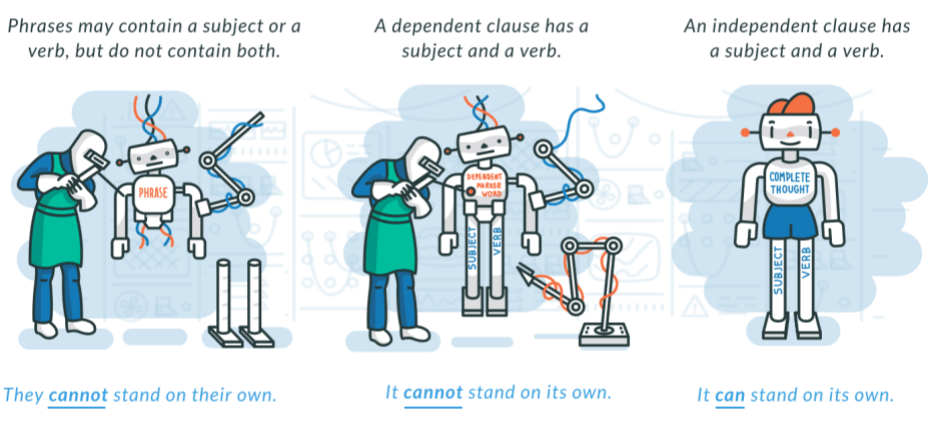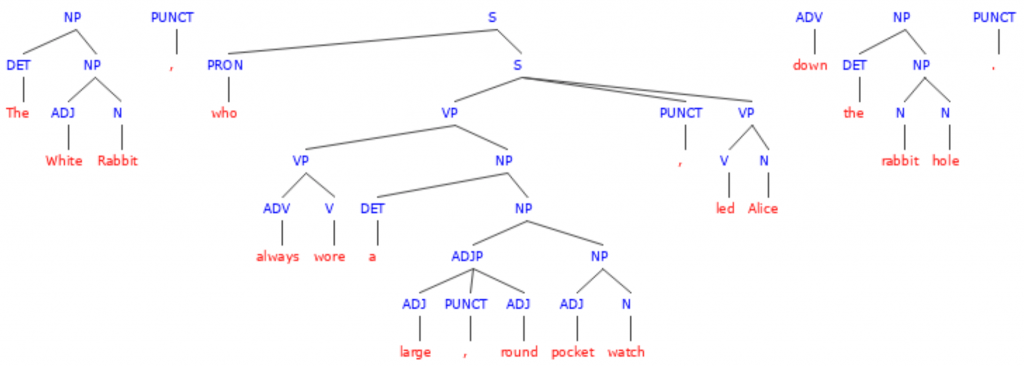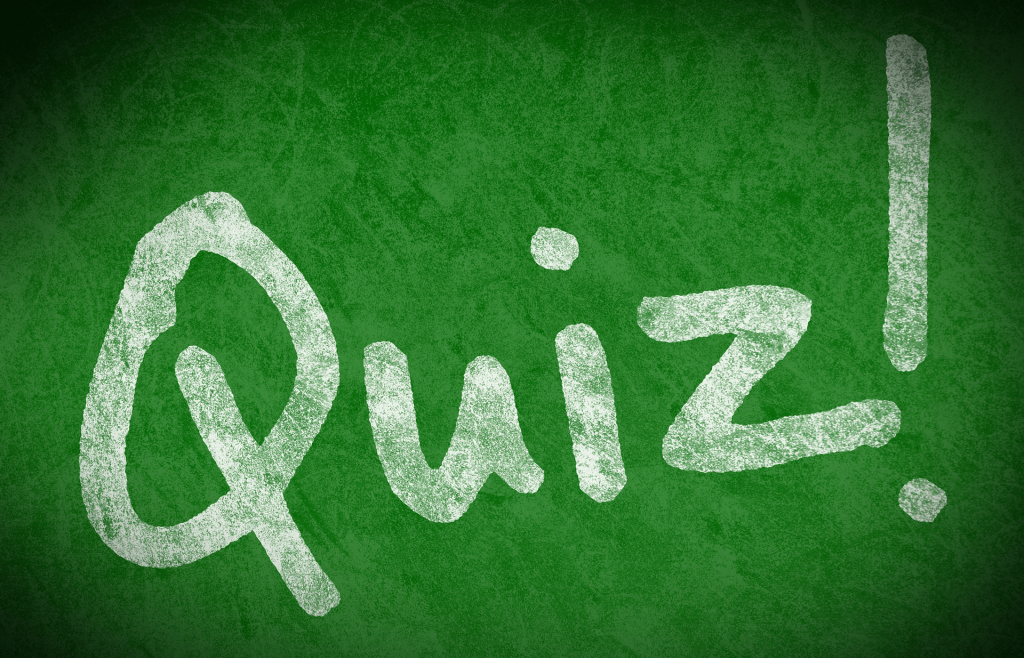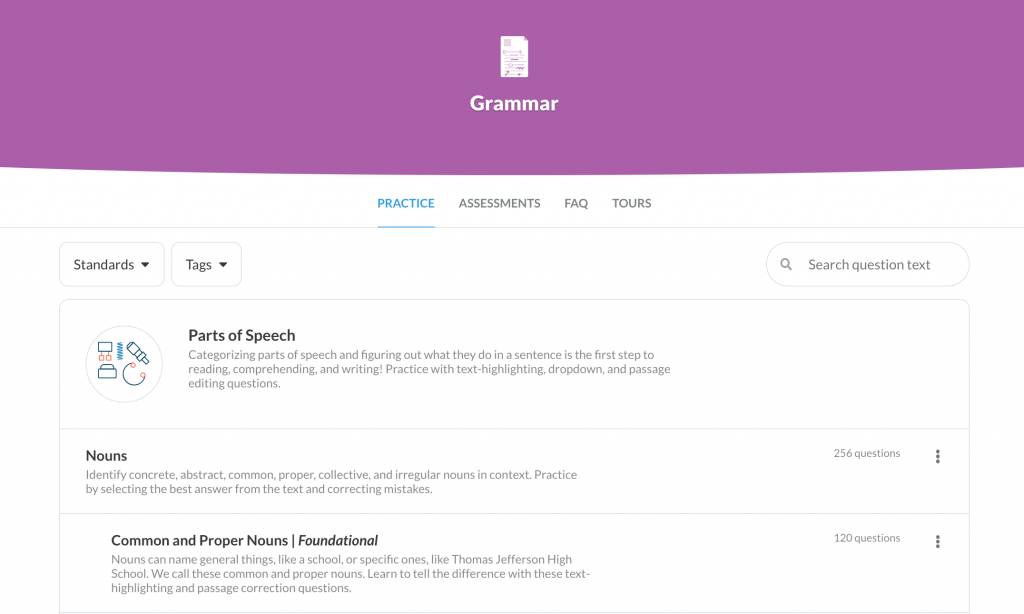How Do You Know the End of a Dependent Clause
Sentences can exist divided into ii types of clauses: contained and dependent . Contained clauses express a complete idea and can be independently from any other clause. Dependent clauses on the other hand cannot be without the help of another clause. If we exit dependent clauses hanging in our writing, not just is our reader confused, but we are writing sentence fragments, or pieces of sentences that are incomplete.
Think nearly it this way– dependent clauses are like wireless headphones. They are completely pointless unless you connect them to a source of power that can stream the music into your headphones. Sure, you lot can play music back on your telephone or laptop, but the headphones are however useless without that essential bluetooth connection .

Similarly, dependent clauses are pretty useless without independent clauses. However, once a connectedness is made between the two, the dependent clause makes sense and extra pregnant is added to the independent clause.
There are many means to both identify dependent clauses and connect them to independent clauses. While this post will focus on dependent clauses , bank check out this mail on the Albert weblog to learn more well-nigh independent clauses. When yous're ready, test yourself with a quiz and practice with our high-quality, standards-aligned questions hither .
The Basics of Dependent Clauses

What is a Dependent Clause?
A dependent clause does non express a consummate thought and therefore depends on an independent clause in order to brand sense.
For case:
- Which is ane of our favorite childhood memories.
Does the clause higher up feel similar a complete thought? Of class not! Reading something like this probably makes yous frustrated considering the writer merely gave you lot a piece of a sentence, or a fragment. In one case the dependent clause above is added to an independent clause, the sentence makes much more than sense:
- We laughed together equally we reminisced wading in the creek behind our house, which is 1 of our favorite memories .
What are the three types of dependent clauses?
Adverbial Dependent Clauses
Adverbial dependent clauses act similar adverbs, which ways that as a clause, they give more information about the main verb that is found in the independent clause. Just like you would not think that a unmarried adverb could make up an entire sentence on its own, these clauses also cannot exist past themselves in your writing.
Adverbial dependent clauses start with subordinating conjunctions such as after, even though, considering, if, equally shortly equally, etc.
If you are unsure whether the dependent clause is acting similar an adverb, run across if it answers i of these questions: where, why, how, when, or to what degree was the action performed?
For example:
- Afterward our trip to the mountains , I realized just how brave black bears tin can exist.
This adverbial clause answers the question, when did the subject realize the bravery of bears ?
Relative Dependent Clauses
Relative dependent clauses human action like adjectives and give more item about a noun that is included in the independent clause. This substantive could be the discipline or an object, but it has to be in the independent clause.
Relative dependent clauses start with relative pronouns such as that, which, who, whom, or whose.
If you are not sure whether the dependent clause is acting as an adverb or as an adjective, enquire if the clause answers ane of these two questions: which i or what kind?
For instance:
- The quaint bookstore that is located downtown has the fluffiest shop cat in residence.

Noun Dependent Clauses
Noun dependent clauses are a little different than adverb or relative clauses. Noun clauses can take the role of literally any noun in the judgement, and so we have to be careful when identifying these clauses.
If the noun clause is acting every bit the subject of the sentence, it is non dependent . However, if the substantive clause is taking the place of an object, it is a dependent clause .
Noun clauses can begin with either interrogative pronouns ( who, what, when, where, how, why) or expletives ( that, whether, if ).
For instance:
- The Cherry Queen demanded to know who painted the roses red .
In the judgement above, the underlined noun clause is acting as the direct object of the verb, demanded .
Here is an case where a noun clause is not dependent:
- What he had washed was irreversible .
Since the noun clause, what he had washed is acting as the subject of the sentence, the entire sentence is one independent clause.
How do dependent clauses connect to independent clauses?
Dependent clauses can come either before or after an independent clause in a sentence. Depending on where they are in the sentence, there are specific ways that they take to be connected with punctuation.
If the dependent clause comes before the independent clause in the sentence, a comma must connect it to the independent clause .
Writers do this to help guide readers to the principal action of the sentence. When readers see the comma after the dependent clause , they realize that the first part of the sentence was just an introduction to the most important information.
For example:
- Whenever I go for a walk , I similar to say, "skillful forenoon", to every dog that I encounter.
In the sentence to a higher place, the dependent clause only lets the reader know when the subject greets her hirsuite friends. Without it, the sentence would still make sense, but it is nice to know these extra details.

Withal, if the dependent clause comes after the independent clause in the sentences, a comma is not needed to connect the ii clauses together.
This is because the reader already understands what the main action of the judgement is, so anything that comes after the master subject and verb is probable to simply be boosted details.
- For example: My mom would not permit me get a pet tiger even though I actually wanted one .
Return to the Table of Contents
3 Tips for Understanding Dependent Clauses
Here are some important tips to aid y'all understand dependent clauses :

Tip #1. Dependent clauses cannot exist alone; they must connect to an contained clause in club to make sens
For example:
- I will never sympathize how the classic film, The Goonies , received a poor rating on Rotten Tomatoes .
The dependent clause underlined higher up is a noun clause interim as a straight object. It is an enormous clause, but it is withal dependent on the iv words that brand up the independent clause earlier it.
Tip #two. Dependent clauses accept the role of adverbs, adjectives, or nouns in sentences
For example:
- Relative clause (answers the question, which ane? ): Do you know the muffin man who lives on Drury Lane ?
- Adverb clause (answers the question, when?): After Jack and Jill rolled downwards the hill, Jack broke his crown.
- Noun clause: (takes the role of the direct object): Do you know how a raven is similar a writing desk-bound?
Tip #3. While dependent clauses are helpful in adding more than information to a sentence, they are not essential in creating a complete thought
For example:
- Although nosotros were in Florida for over a week , we never saw an alligator.
The independent clause, we never saw an alligator, does not demand the underlined clause to make grammatical sense; nevertheless, it does add some helpful information about both when and where the alligator was not seen by the subject.
Render to the Table of Contents
Applying the Basics: Dependent Clause Review & Do
Now that you understand how dependent clauses function in sentences, review the anchor nautical chart below and complete the review to fully understand how to use and recognize dependent clauses .
The Ultimate Listing of Clauses
Refer to the graphic below to learn the different types of Clauses :

This list, obviously, does not include all possible examples of clauses; however, it is meant to be used equally a guide while identifying sentence clauses.
Dependent Clauses Exercises and Review
Now that you know how to identify dependent clauses , examination your ability to find these in sentences.

Select the dependent clause(s) in the sentences beneath. Remember, a dependent clause can act as an adverb, an describing word, or a noun, only it cannot express a consummate thought without connecting to an contained clause.
i. The White Rabbit, who always wore a large, round pocket watch , led Alice down the rabbit hole.
In this sentence, who ever wore a large, round pocket watch is the dependent clause . This clause is acting like an adjective considering it modifies the subject of the judgement, the White Rabbit.
2. Afterwards the Ruby-red Queen destroyed his village, the Mad Hatter swore vengeance on her and her wicked kingdom.
In this sentence, the dependent clause is after the Red Queen destroyed his village . This clause is acting like an adverb because it modifies the verb, swore, and tells the reader when and why the Mad Hatter "swore vengeance" on the queen.
three. Alice was chosen to fight the Jabberwocky even though she had never fought before .
In this sentence, even though she had never fought earlier is a dependent clause because it begins with a subordinating conjunction and is not separated from the independent clause through the utilise of a semicolon and a comma.
4. Alice did not know how she ended up in Wonderland .
In this judgement, how she ended up in Wonderland is a dependent clause that takes the place of the substantive direct object in the sentence.
five. As the Cheshire cat smiled , his trunk began to disappear, and presently all that was left was his cheesy grin.
In this sentence, the clause every bit the Cheshire Cat smiled is dependent because information technology acts like an adverb that shows when the cat disappeared.
Pro tip : Remember, dependent clauses take the identify of an adverb, an adjective, or a substantive in a sentence and cannot express a complete thought without the help of an independent clause.
For additional practise, check out Dependent Clauses content on Albert.
Return to the Table of Contents
Try for Yourself: Dependent Clauses Quiz

Feeling confident in your agreement of Dependent Clauses ?
Accept this short half-dozen-question quiz to encounter what yous've learned:
ane. Tin can a dependent clause start with a relative pronoun?
- Answer: Yeah
- Correct Explanation: That'southward right! A dependent clause tin start with a relative pronoun because relative pronouns take to "relate" or connect back to some other noun in the sentence. This "other noun" is always found in the contained clause, and since dependent clauses rely on independent clauses, it is perfectly logical that a dependent clause could begin with a relative pronoun.
- Incorrect Explanation: Sad, that's not right! Call back, dependent clauses can begin with relative pronouns, interrogative pronouns, expletives, or subordinating conjunctions.
2. Practise yous need to use a comma later the dependent clause if it comes later on the independent clause in a sentence?
- Answer: No
- Correct Explanation: That's right! If dependent clauses come before the contained clause in a sentence, a comma is necessary to carve up the two. If the dependent clause comes subsequently the independent clause, a comma is not needed.
- Incorrect Explanation: Sorry, that's not correct! Call up, If a dependent clause comes before the independent clause in a sentence, a comma is necessary to dissever the ii. If the dependent clause comes later on the contained clause, a comma is not needed.
3. In this judgement, is the underlined clause independent or dependent?
Although I missed the charabanc this morn, I still made information technology to school on time.
- Answer: Dependent
- Correct Explanation: That's right! The underlined clause is dependent considering information technology begins with a subordinating conjunction and does not express a consummate thought.
- Incorrect Explanation: Sorry, that'south not correct! Remember, dependent clauses tin start with a subordinating conjunction, a relative pronoun, an interrogative pronoun, or an expletive, and these clauses cannot limited a complete thought.
4. In this sentence, is the underlined clause contained or dependent?
She has e'er disliked trying new foods; however, today she decided to try sushi for the offset time .
- Answer: Independent
- Right Caption: That'southward right! The underlined phrase is contained for 2 reasons: commencement, it expresses a complete idea. Secondly, even though it begins with a subordinating conjunction, this conjunction is prepare apart from the clause by both a semicolon and a comma, making it independent.
- Incorrect Explanation: Sorry, that's non correct! Call up, while some dependent clauses begin with subordinating conjunctions, when the conjunction is ready apart from the clause through the use of a semicolon and a comma, the clause is contained.
5. In this sentence, is the underlined clause independent or dependent?
She named her true cat Mrs. Norris considering she is such a huge Harry Potter fan.
- Reply: Independent
- Correct Explanation: That's right! In this sentence, the underlined clause is independent because it expresses a consummate thought and tin stand on its own without the rest of the sentence.
- Incorrect Explanation: Sorry, that's not right! Remember, contained clauses can express a consummate thought without the help of whatever other clauses in the sentence.
six. In this sentence, is the underlined clause independent or dependent?
If Disney World reopens , we volition visit late this year.
- Answer: Dependent
- Correct Explanation: That's right! The underlined clause if Disney Earth reopens is a dependent clause that introduces the independent clause.
- Incorrect Explanation: Sorry, that's not right! Remember, dependent clauses can showtime with a subordinating conjunction, a relative pronoun, an interrogative pronoun, or an curse, and these clauses cannot limited a complete thought.
For additional do with Dependent Clauses , check out our practice on Albert: Dependent Clauses .
Return to the Tabular array of Contents
Teacher's Corner for Dependent Clauses
Many students understand that a consummate sentence contains a subject and a verb, but what if that sentence does not create a complete idea? Dependent clauses may look a whole lot like contained clauses, simply they are simply meant to complement the independent clause and not stand on their own.
Therefore, it is of import for students to know how to place both contained and dependent clauses and how to utilize these dissimilar clauses in their writing. The Common Core English Linguistic communication Progressive Skills Chart is a useful resources for teachers working with a wide variety of students on dissimilar grammatical skill levels.
For specific standards on the different types of clauses including dependent clauses, check out the Common Core State Standards website.
Albert's Dependent Clause Do offers several different practices to scaffold students as they become more than comfortable with identifying unlike types of clauses. Albert as well provides cumulative assessments and shorter topic quizzes that can be utilized past educators to measure student progress.
Summary for Dependent Clauses
Dependent clauses do not express a complete thought. They depend on at least one independent clause in order to make sense and create a consummate judgement.
There are 3 types of dependent clauses :
ane. Adverbial clauses
- They answer 1 of these questions: where, why, how, when, or to what degree was the action performed?
ii. Relative clauses
- They answer one of these two questions: which one or what kind?
3. Substantive clauses
- They act as subjects or objects and can begin with either interrogative pronouns ( who, what, when, where, how, why) or expletives ( that, whether, if ).
Be sure to cheque out our grammar grade for more Dependent Clause practice.
You lot tin also access over 3,400 high-quality questions that address virtually every grammatical concept.
Need help preparing for your Grammar test?

Albert has hundreds of grammar exercise questions with detailed explanations to help you lot master concepts.
petersthrainater1946.blogspot.com
Source: https://www.albert.io/blog/dependent-clauses/
0 Response to "How Do You Know the End of a Dependent Clause"
Post a Comment